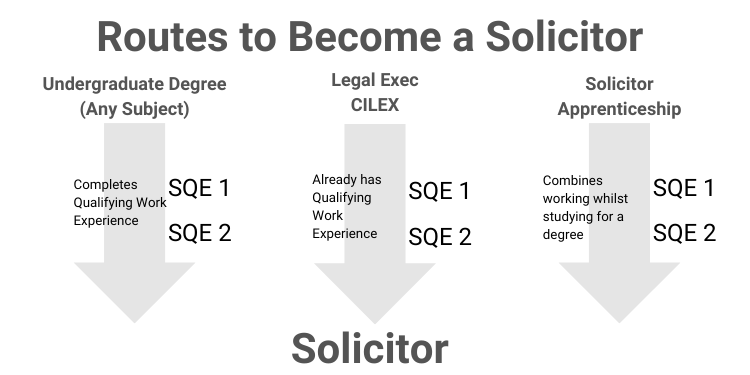Passing the Solicitors Qualifying Examination (SQE) is a requirement for practising as a solicitor in England and Wales. The SQE was introduced in 2021 to replace the Legal Practice Course (LPC) and qualifying law degree requirements.
The SQE aims to standardise entry into becoming a solicitor.
The most significant change introduced with the SQE was the removal of the requirement to hold a qualifying law degree for the graduate route. There are now 3 paths to becoming a solicitor, all of which involve taking the SQE:
In addition to passing the SQE assessments, to practise as a solicitor in England and Wales, you’ll need to:
- Hold a degree in any subject; or
- Be a Legal Executive and take the CILEX certification; or
- Join a Solicitor Apprenticeship
AND
- Have 2 years’ Qualifying Work Experience
- Meet the Solicitors Regulation Authority (SRA)’s character and suitability requirements
This change was introduced to enable greater access to a career in law.
However, if you’re taking the degree route, it’s important to note the SQEs are challenging, so the recommended pathway is to complete an undergraduate law degree or postgraduate law conversion course before taking the SQE. A number of universities offer these courses, as well as dedicated SQE preparation programmes to help students prepare to sit the exams, whichever pathway they’re taking to become a solicitor.
What’s Involved in the SQE?
The SQE has 2 parts: SQE1 and SQE2.
SQE1 assesses foundational legal knowledge, while SQE2 evaluates practical legal skills and knowledge. The SQE is an in-person exam held at exam centres and various testing centres throughout England and Wales.
SQE1
The SQE1 consists of 180 multiple-choice questions to measure candidates’ Functioning Legal Knowledge (FLK). The first part of the SQE is split into 2 sections: FLK 1 and FLK 2.
FLK 1 covers:
- Business law and practice
- Dispute resolution
- Contract law
- Tort law
- English legal system
- Constitutional law & human rights
- Public law
- Legal services
- Professional conduct
FLK 2 covers:
- Property practice
- Wills and the administration of estates
- Solicitors’ accounts
- Land law
- Trusts
- Criminal law & practice
SQE2
You need to pass the SQE1 to take the second part. The SQE2 tests practical legal skills in 2 parts: Oral arguments and written assessments.
The SQE2 grades the following skills:
- Client interview and attendance note/legal analysis
- Advocacy
- Case and matter analysis
- Legal research
- Legal writing
- Legal drafting
SQE Preparation Courses
The SQE is a set of challenging and demanding exams. While taking the SQE without a preparation course is possible, it’s not recommended. In addition to an LLB or law conversion course, many universities also offer dedicated SQE preparation programmes.
Undergraduate Law Degrees
Taking an undergraduate law degree is still the traditional way to become a solicitor. In particular, an LLB (Bachelor of Law) is classed as a qualifying law degree.
A qualifying law degree provides the foundation of English law theory, and graduates should be equipped to progress to taking the SQE.
Postgraduate Law Conversion Courses
For those looking for a career in law with an unrelated undergraduate degree, a law conversion course is recommended to get up to speed and cover the main areas of law in one year or less.
These intense and demanding courses cover 3 years of undergraduate study in 12 months or less. There are a few different course types to choose from when taking a conversion course.
You can read more about the GDL, PDGLs and Law Conversion LLMs.
SQE Preparation Programmes
These short courses are designed to help students practise and pass the SQE. Some Law conversion courses include SQE preparation as part of their syllabus.
Taking SQE preparation courses is not compulsory, and the SRA advises that either a law degree or the required in-work training should be sufficient to pass the exams. However, they’re a popular option for those wanting to be as prepared as possible for the SQE assessments.
SQE Costs
If you’re taking the solicitor apprenticeship or CILEX route, it’s recommended that you speak with your current employer about covering your costs.
The SRA sets the fees for the SQE assessments. If you take the SQE independently, you’ll need to budget around £4,000 for the exam fees alone. The SQE is not eligible for government-backed student loans, so saving or taking out a commercial bank loan are the 2 main options to cover the fees.

